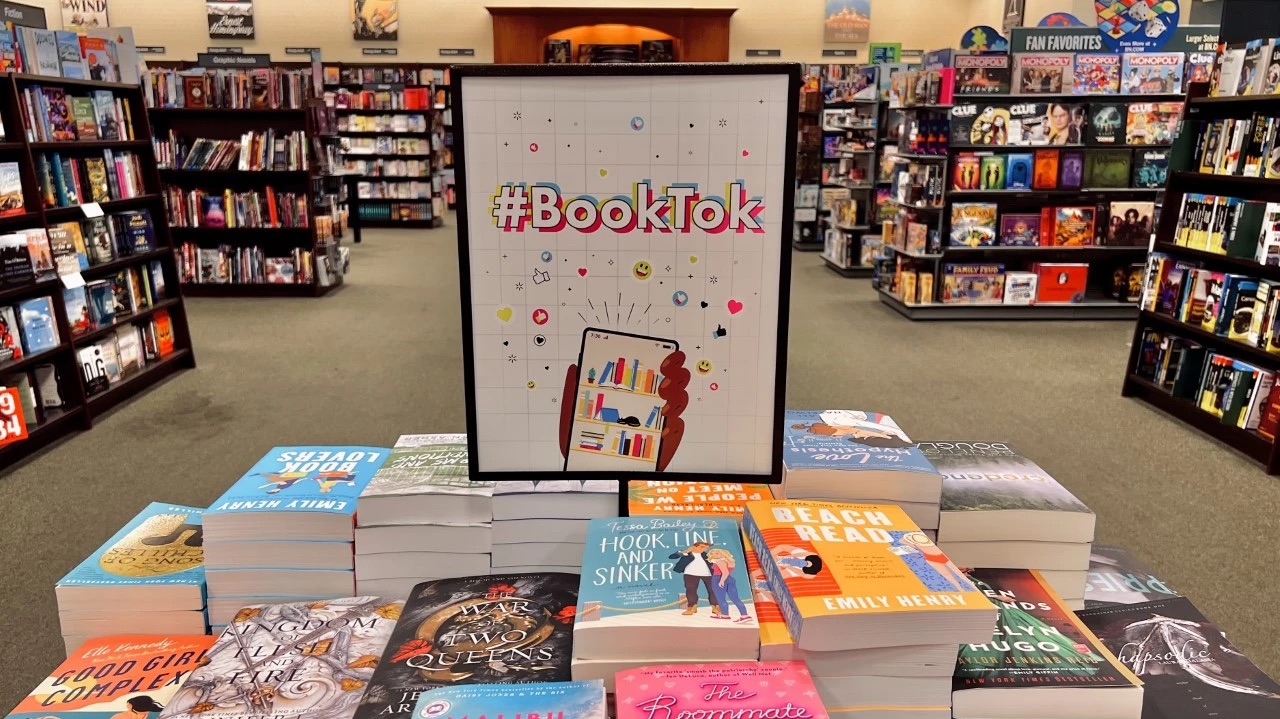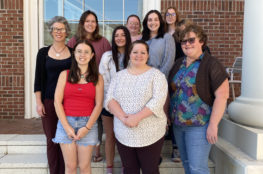#BookTok, a large sub-community on TikTok for book lovers who review, discuss, and promote their favorite, or least favorite, books, has taken the reading community by storm in recent years. On your most recent trip to your favorite bookstore, you may have noticed they even have shelves and displays dedicated to #BookTok recommendations. The English community has had many conversations about how technology is harmful to physical books; however, that discourse may be changing, as it’s estimated that 20 million printed books were sold in 2021 alone, solely due to #BookTok and the circulation of recommendations. In fact, the number of physical books purchased in 2021 was more than it’s ever been since 2004 (Bateman).
Authors and publishing companies have also been using #BookTok to promote their books to reach younger audiences and grow sales. For example, Colleen Hoover is now one of the most talked-about romance authors in the country due to #BookTok and its users recommending her novels. Hoover even created a TikTok account, featuring a video of her buying her mother a car with some of the money she has acquired from her recent fame. However, in recent weeks, another author has “gone viral” and it’s raised many questions, support, and criticism from publishers and authors alike.
Lloyd Devereuk Richard, a full-time lawyer, published a book in 2012 after spending 14 years writing it, only to garner little to no sales or support. When his daughter posted a 16-second TikTok sharing her father’s story with the world, however, it “blew up” with 10.8 million likes and 51 million views. Devereux Richard’s thriller novel, Stone Maidens, quickly hit records like the internet had never seen, reaching over 65,000 sales and hitting the No. 1 Amazon Bestsellers list in an instant (VanDerveer). The author quickly became a well-known persona in the #BookTok community, gathering support from millions of followers, one who commented: “Moments like this are why I stay on this app. The love & generosity from people is astounding. There is definitely more good than evil.” (@TSpin)
While this is a heartwarming and possibly tear-inducing story, it raises the question of how powerful social media promotions can be and how influence works in the reading community. I’m sure we’ve all been influenced to buy a book or two simply based on a friend’s recommendation, but how far can that encouragement go? Viewers of the Stone Maidens story aren’t the only ones to notice this change; publishing houses and companies have also started to advertise through social media to achieve high marketing status, but many have failed due to a lack of authenticity in the social media posts.
Professor Jason Ockert, a creative writer and published author at CCU, doesn’t currently use social media, as he has found it more detrimental to his life than beneficial. Ockert used Twitter in the past but found that it became a distraction to his creative writing process and drew him away from reading in his free time.
“I just know that for myself, it detracts from what I value the most, which is the creation in the process of working, doing the real work of battling the story.”
In his undergrad years, Ockert would submit his work to publishers and mail his creative writing to journals that he thought matched up with his writing style. Ockert emphasizes that his style of writing is what really caught people’s eye: “You become distinctive as a writer at the sentence level; it’s the discourse that allows you to be distinctive. Your sentences are the thing that will make you stand out from anybody else.” In times of ChatGPT and Open AI, the way a writer crafts their sentences is what can really set you apart from writers and robots alike.
Nowadays, many editors and agents want their writers to have a substantial number of followers on social media. Ockert said, “there’s a little bit of influence from the agent or from editors to promote [writing on social media].” This push to promote writing on social media can cause an increase in book sales, as we’ve seen from the statistics above. However, Ockert doesn’t measure his success or the value of his work by followers or likes; he measures it by the experience he is able to give his readers. Ockert suggested that writers who use social media need to find a balance between “trying something new” and “chasing down a trend” when sharing one’s work with the world, stating, “I do think that you should be aware of the pulse of what’s going on.”
In the face of AI writing and TikTok fame, Ockert believes in individual growth and strength, emphasizing the power of always having one or two people who believe in you and your writing ability. When deciding whether or not to continue his use of social media, Ockert asked himself, “Does it bring me joy, or does it extract from joy?”
While some do find joy in #BookTok as a space for conversing with others about their favorite stories, others find it grounded in physical interaction and print books. Whether you choose to enter into a career in publishing or writing, you get to make the decision for yourself whether social media interaction and promotions are right for you.
Works Cited:
Bateman, Kayleigh. “This Is How TikTok Helped Propel Book Sales to a Bestselling Year.” World Economic Forum, 11 Mar. 2022, https://www.weforum.org/agenda/2022/03/tiktok-booktok-print-books-sales/.
VanDerveer, Melanie. “’Stone Maidens’ Sells 65,000 Copies after Viral TikTok Video.” The Blast, 26 Feb. 2023, https://theblast.com/455907/after-decades-of-no-sales-stone-maidens-sells-65000-in-two-weeks-after-tiktok-video/.


